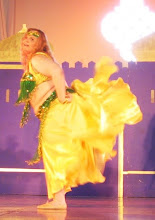Where Have All The Funny Women Gone?
I'm sitting here watching the Monday night sitcoms and ruminating on the fact that there aren't as many funny women starring in shows as funny men. From early in the history of television there have been funny women whose antics made their audiences laugh. Comedy is certainly an ensemble creation, with the exception of stand-up comedy, but I'm specifically interested in the world of sitcoms. I Love Lucy started everything up, but then came along I Dream of Jeannie and Bewitched. Mary Tyler Moore and Carol Burnett have earned their places in history as well. But somewhere along the lines women have become the straight guy to their male comedic counterparts. Sure there were Murphy Brown, Ellen, and Grace Under Fire through the nineties, but where are the funny ladies of the new century? Are they all destined to be the serious partner in the comedic relationship? How did this happen? I suspect that it has something to do with the feminist movement.
In a number of Shakespeare's comedies, female characters would dress up as boys or young men in order to become liberated from the expectations society placed on the importance of being and acting like a lady. In the modern age, women have indeed found that working outside the home and being more than just a lady is indeed liberating. In the early days of television the boundaries that separated masculinity from femininity were explored; Lucy's antics were often very physical and defied the notion that women and physical humor excluded one another due to the female upbringing and the proper demeanor a lady ought to possess. In both I Dream of Jeannie and Bewitched, the women were powerful, far more powerful than the men they were with. The men were the ones who had to play it straight. Women became empowered by watching women like these and other working women like Mary Tyler Moore.
As women became more equal in the workplace, we began to see more and more workplace comedies. Murphy Brown and Grace Under Fire were two tough women with a funny side, but certainly they were more serious than their earlier counterparts, perhaps because they were dealing with and exploring the issues surrounding women in the post-feminist era.
In the nineties and up to this year's sitcoms, we've started to see fewer and fewer female leads. Sure there was Sex in the City, if you had the right cable channel, but on the main networks comedic female leads haven't fared nearly as well. Women are thriving in the worlds of Law and Order and CSI; they are portrayed as intelligent and sexy, but where are the intelligent, sexy women who used to have on the small screen? What effect will this have on the kids watching tonight's sitcoms? Will these boys grow up to think that the boorish behavior of some of the father characters is acceptable while the women have to be more serious and figure out how to solve the problems they face as a couple? Will it someday lead to the notion that women who are funny lack restraint? I guess we'll just have to stay tuned.


0 Comments:
Post a Comment
<< Home